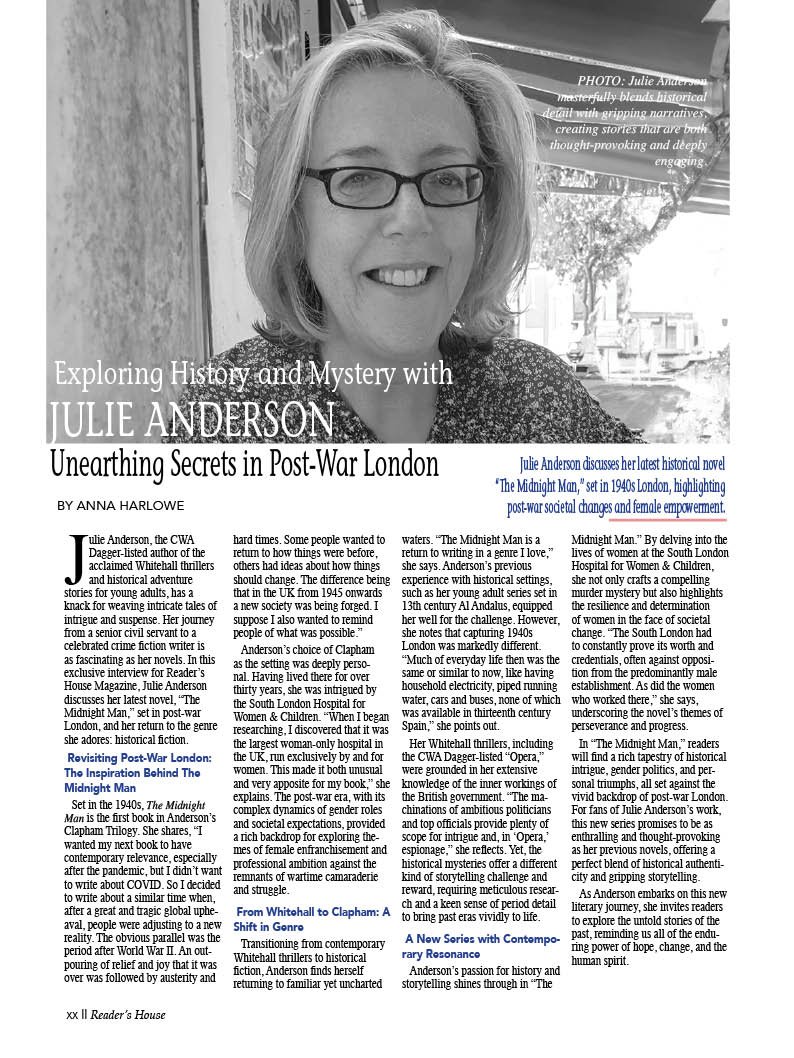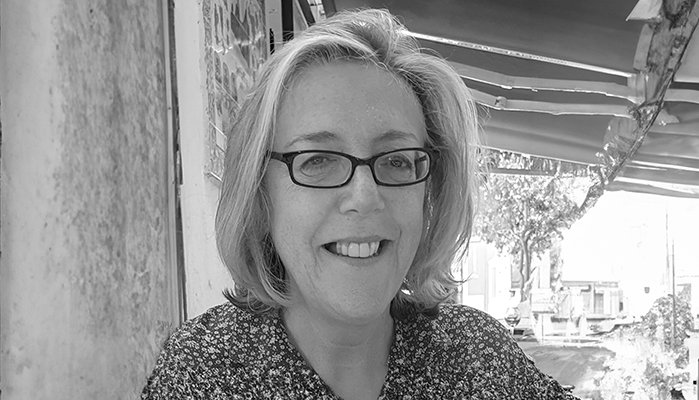Exploring History and Mystery with the Acclaimed Author of The Midnight Man
Julie Anderson discusses her latest historical novel “The Midnight Man,” set in 1940s London, highlighting post-war societal changes and female empowerment.
BY ANNA HARLOWE
Julie Anderson, the CWA Dagger-listed author of the acclaimed Whitehall thrillers and historical adventure stories for young adults, has a knack for weaving intricate tales of intrigue and suspense. Her journey from a senior civil servant to a celebrated crime fiction writer is as fascinating as her novels. In this exclusive interview for Reader’s House Magazine, Julie Anderson discusses her latest novel, The Midnight Man, set in post-war London, and her return to the genre she adores: historical fiction.
Revisiting Post-War London: The Inspiration Behind The Midnight Man
Set in the 1940s, The Midnight Man is the first book in Anderson’s Clapham Trilogy. She shares, “I wanted my next book to have contemporary relevance, especially after the pandemic, but I didn’t want to write about COVID. So I decided to write about a similar time when, after a great and tragic global upheaval, people were adjusting to a new reality. The obvious parallel was the period after World War II. An outpouring of relief and joy that it was over was followed by austerity and hard times. Some people wanted to return to how things were before, others had ideas about how things should change. The difference being that in the UK from 1945 onwards a new society was being forged. I suppose I also wanted to remind people of what was possible.”
Anderson’s choice of Clapham as the setting was deeply personal. Having lived there for over thirty years, she was intrigued by the South London Hospital for Women & Children. “When I began researching, I discovered that it was the largest woman-only hospital in the UK, run exclusively by and for women. This made it both unusual and very apposite for my book,” she explains. The post-war era, with its complex dynamics of gender roles and societal expectations, provided a rich backdrop for exploring themes of female enfranchisement and professional ambition against the remnants of wartime camaraderie and struggle.
From Whitehall to Clapham: A Shift in Genre
Transitioning from contemporary Whitehall thrillers to historical fiction, Anderson finds herself returning to familiar yet uncharted waters. “The Midnight Man is a return to writing in a genre I love,” she says. Anderson’s previous experience with historical settings, such as her young adult series set in 13th century Al Andalus, equipped her well for the challenge. However, she notes that capturing 1940s London was markedly different. “Much of everyday life then was the same or similar to now, like having household electricity, piped running water, cars and buses, none of which was available in thirteenth century Spain,” she points out.
Her Whitehall thrillers, including the CWA Dagger-listed Opera, were grounded in her extensive knowledge of the inner workings of the British government. “The machinations of ambitious politicians and top officials provide plenty of scope for intrigue and, in ‘Opera,’ espionage,” she reflects. Yet, the historical mysteries offer a different kind of storytelling challenge and reward, requiring meticulous research and a keen sense of period detail to bring past eras vividly to life.
A New Series with Contemporary Resonance
Anderson’s passion for history and storytelling shines through in The Midnight Man. By delving into the lives of women at the South London Hospital for Women & Children, she not only crafts a compelling murder mystery but also highlights the resilience and determination of women in the face of societal change. “The South London had to constantly prove its worth and credentials, often against opposition from the predominantly male establishment. As did the women who worked there,” she says, underscoring the novel’s themes of perseverance and progress.
In The Midnight Man, readers will find a rich tapestry of historical intrigue, gender politics, and personal triumphs, all set against the vivid backdrop of post-war London. For fans of Julie Anderson’s work, this new series promises to be as enthralling and thought-provoking as her previous novels, offering a perfect blend of historical authenticity and gripping storytelling.
As Anderson embarks on this new literary journey, she invites readers to explore the untold stories of the past, reminding us all of the enduring power of hope, change, and the human spirit.
Follow the Author
- Amazon https://tinyurl.com/37pwjs3t
- Hobeck https://tinyurl.com/ppy678ra
- Waterstones https://tinyurl.com/5byu5rdd
- Website julieandersonwriter.com
- FB Facebook
- Twitter @julieandersonwriter (@jjulieanderson) / X (twitter.com)
- Publishers Hobeck Books | publisher



